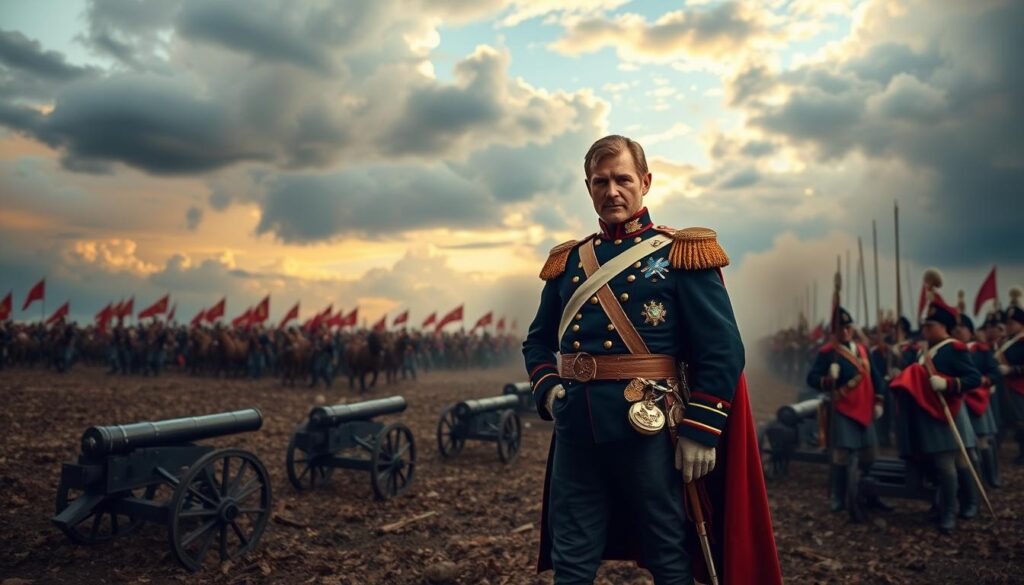Napoleon Bonaparte started as a nobody after the French Revolution. He became First Consul in 1799 and Emperor in 1804. His military skills were shown at the Battle of Austerlitz in 1805. There, 68,000 French troops beat 90,000 Russians and Austrians.
At his peak, Napoleon’s empire had 70 million people under his rule. But, his dreams of conquest led to disaster in the Russian Campaign of 1812. His 600,000-strong army was left with fewer than 100,000 survivors.
This article tells the amazing story of Napoleon Bonaparte. It covers his journey from Corsica to becoming the Emperor of France. It also looks at his military victories and the events that led to his downfall. Readers will learn about Napoleon’s triumphs and failures.
Key Takeaways
- Napoleon Bonaparte rose to power after the French Revolution, becoming First Consul in 1799 and Emperor in 1804.
- His military brilliance was exemplified at the Battle of Austerlitz in 1805, where his French troops defeated a larger Russian and Austrian force.
- At its peak, Napoleon’s empire controlled 70 million people across Europe.
- However, his ambitions led to disaster during the Russian Campaign of 1812, where his Grand Army was decimated.
- This article explores the captivating journey of Napoleon, from his rise to power to the events that ultimately led to his downfall.
The Rise and Fall of Napoleon
Napoleon Bonaparte’s journey from a young Corsican military officer to a European emperor is fascinating. It’s a story of ambition, power, and the rise and fall of a legendary figure in French history. This section looks at the key events and factors that shaped Napoleon’s ascent and downfall.
The rise of Napoleon was marked by his military skill and strategic mind. As a young officer, he quickly climbed the ranks, playing a key role in the French Revolution. He then seized power as First Consul of France. His empire building efforts expanded French influence across Europe, with victories in many power struggles and military campaigns.
However, Napoleon’s fall from grace was dramatic. His disastrous invasion of Russia in 1812 was a turning point, leading to defeats that forced his abdication and exile. The coalition wars that followed weakened his control, ending in his final defeat at the Battle of Leipzig.
| Key Events in the Rise and Fall of Napoleon | Year |
|---|---|
| Napoleon’s rise to power as First Consul of France | 1799 |
| Napoleon crowned as Emperor of France | 1804 |
| Invasion of Russia | 1812 |
| Battle of Leipzig | 1813 |
| Napoleon’s abdication and exile to Elba | 1814 |
| Napoleon’s final defeat and exile to Saint Helena | 1815 |
The legacy of Napoleon is still debated by historians and scholars. They try to understand his complex role in European history and the lasting impact of his conquests and geopolitical strategies. Whether seen as a heroic visionary or a ruthless tyrant, Napoleon’s story is a captivating and influential chapter in French history.
Who Was Napoleon Bonaparte?
Napoleon Bonaparte was a famous Corsican conqueror who changed European history. He was born in 1769 on the island of Corsica. He became a key figure, leaving a lasting legacy that still interests many today.
Corsican Origins
Napoleon came from a wealthy family in Corsica. His early years were marked by the island’s fight for freedom from France. This struggle inspired his own dreams of power and conquest.
Early Military Career
Napoleon was drawn to the military at a young age. He studied at Paris’s top military academy. His early battles, like the siege of Toulon in 1793, showed his genius in strategy and tactics. This led to his quick rise in rank.
- Graduated from the military academy in Paris
- Participated in the siege of Toulon in 1793, demonstrating his military expertise
- Quickly rose through the ranks, establishing himself as a talented military commander
As Napoleon’s early life and military career progressed, he set the stage for his rise to power. This led to significant events in European history.
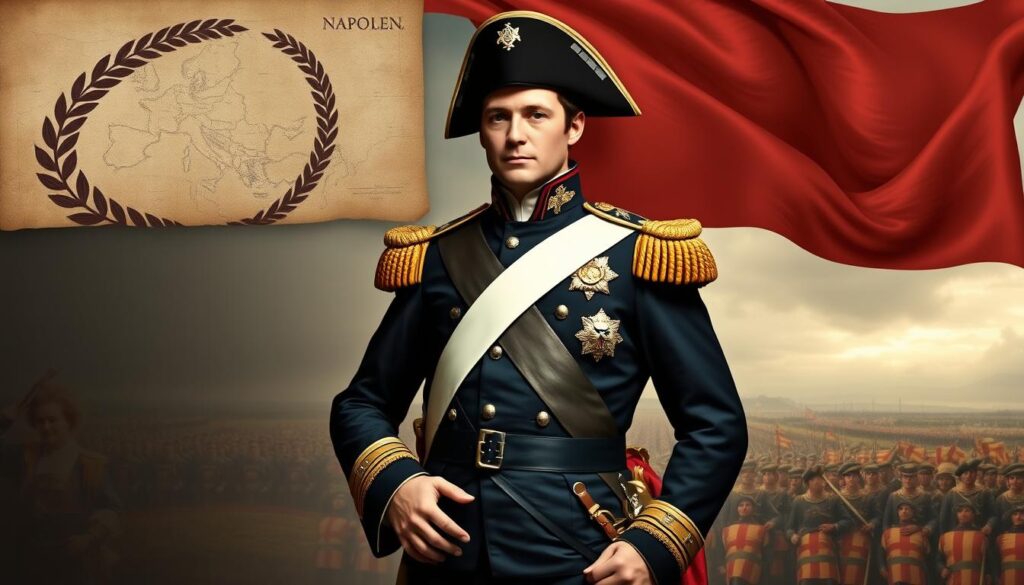
Napoleon Bonaparte quickly became famous for his military wins. These victories made him a top figure in the French Revolution. He conquered Italy and Europe, changing history with his skills and drive.
His first big win was in the Italian Campaign. He beat the Austrians and their friends. This campaign showed his smart tactics and helped France grow stronger.
- The Battle of Lodi (1796) showed Napoleon’s bravery and leadership. He led a bold charge, inspiring his troops to victory.
- The Siege of Mantua (1796-1797) was a key win for Napoleon. His forces captured the Austrians, giving France control over Italy.
- The Battle of Arcole (1796) was another victory for Napoleon. He used his tactical skills and courage to lead his troops to success.
Napoleon’s early wins boosted his fame and set the stage for his rise. His skill in battle and ambition made him a major force in Europe.
| Campaign | Year | Result |
|---|---|---|
| Italian Campaign | 1796-1797 | French Victory |
| Battle of Lodi | 1796 | French Victory |
| Siege of Mantua | 1796-1797 | French Victory |
| Battle of Arcole | 1796 | French Victory |
Napoleon’s early victories gave France more power and resources. They also made him known as a brilliant strategist. These wins were the start of his journey to becoming a key figure in European history.
The Consulate and Napoleon’s Rise to Power
Napoleon Bonaparte took control of France and made big changes. He started a new era called the Consulate. This was a key moment in his journey to power and the start of the French Empire.
Political Reforms
Napoleon made big changes in government during the Consulate. He became the First Consul, the top leader of France. He also changed the courts, made the government work better, and created a new law code.
Domestic Achievements
Napoleon worked hard to improve France. He built roads, bridges, and canals to help the economy. He also supported the arts, sciences, and education, creating places like the Louvre Museum and the University of France.
| Political Reforms | Domestic Achievements |
|---|---|
|
|
The Consulate was a turning point for Napoleon. He became the strong leader of France and set the stage for the French Empire. His reforms and achievements helped him become a powerful ruler, ready to conquer more of Europe.
The Napoleonic Wars: Europe Under Siege
The Napoleonic Wars changed Europe in the early 19th century. Napoleon Bonaparte wanted to expand France’s power. He made France the top country in Europe, using the Continental System to weaken Britain.
The Continental System
Napoleon started the Continental System in 1806. It aimed to stop Britain from trading with Europe. This was key to Napoleon’s plan to make France the strongest nation.
The system made European countries under France ban British goods. Napoleon’s wins let him spread this rule across Europe. But, it caused economic problems and anger in many countries.
| Country | Compliance with Continental System |
|---|---|
| France | Fully Implemented |
| Britain | Refused to Comply |
| Prussia | Partially Complied |
| Austria | Partially Complied |
| Russia | Initially Complied, Later Withdrew |
The Napoleonic Wars and the Continental System changed Europe a lot. Napoleon’s plans worked for a while but failed in the end. They led to the fall of his empire and new power shifts.
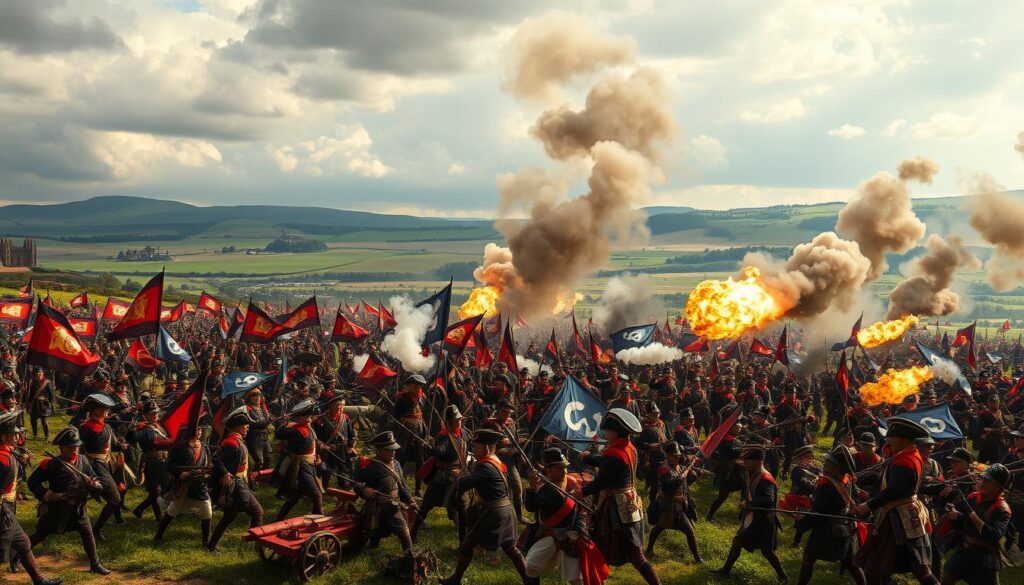
Napoleon’s Reforms and Domestic Achievements
Napoleon Bonaparte made a big impact on France, not just through war. He brought about many changes in the country. One key achievement was the Napoleonic Code, a legal system that changed French law and influenced Europe.
The Napoleonic Code made French law simpler and fairer. It set rules for equality, property, and fair trials. It also made the legal system more organized. This reform showed Napoleon’s vision for a fair society.
Napoleon also worked on improving France’s infrastructure. He built roads, bridges, and canals to boost the economy and travel. He also supported the arts and sciences, creating new places for culture and learning.
| Domestic Reform | Impact |
|---|---|
| Napoleonic Code | Modernized French legal system, influenced European jurisprudence |
| Infrastructure Development | Improved transportation, facilitated economic growth |
| Support for Arts and Sciences | Encouraged cultural and scientific advancements |
Napoleon’s work on domestic reforms and achievements made a lasting impact. His vision for a modern, prosperous France is his true legacy. His military victories were just part of his story.
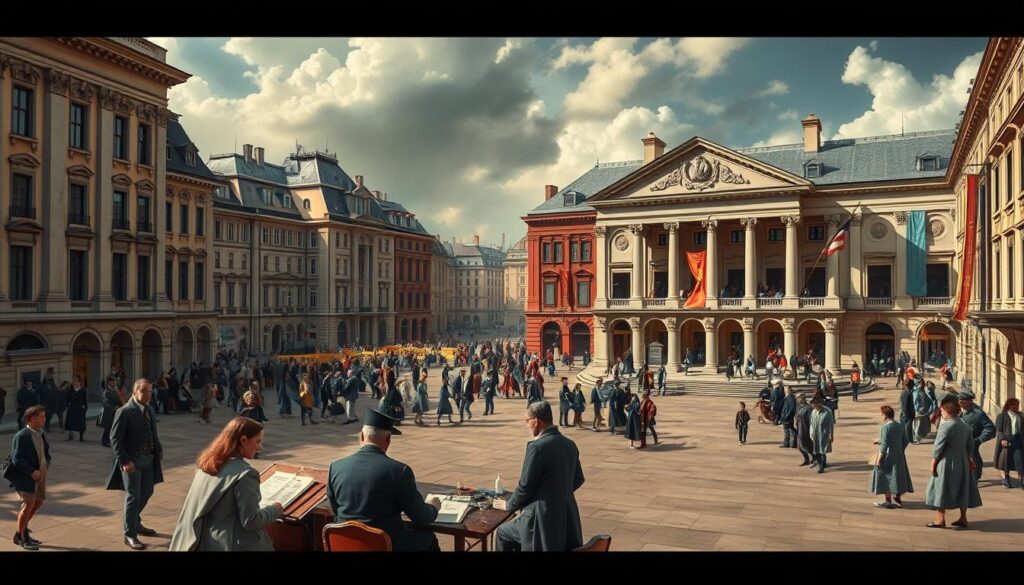
The Invasion of Russia: The Beginning of the Downfall
Napoleon’s invasion of Russia in 1812 was a turning point. It marked the start of his military campaigns’ downfall. The French, led by Napoleon, tried to conquer the Russian Empire. But, this bold move turned out to be a disaster for Napoleon’s empire.
Military Tactics and Strategies
Napoleon’s invasion of Russia was a bold move. He aimed to control Europe. The French used many tactics, including:
- Massive troop deployments, with over 600,000 soldiers in the Grande Armée.
- Reliance on speed and mobility, aiming to overwhelm the Russian defenses.
- Utilization of the Continental System, a trade blockade designed to weaken Russia’s economy.
- Attempts to divide and conquer the Russian forces through strategic maneuvers.
But, the French faced many challenges. The vast distances, harsh winter, and Russian resilience were big hurdles.
| Military Tactics | Strategies |
|---|---|
| Massive troop deployments | Reliance on speed and mobility |
| Utilization of the Continental System | Attempts to divide and conquer the Russian forces |
The invasion of Russia was a disaster for Napoleon. It marked the start of his downfall. The French faced huge challenges, including the harsh winter and Russian resilience. This led to their defeat and retreat.
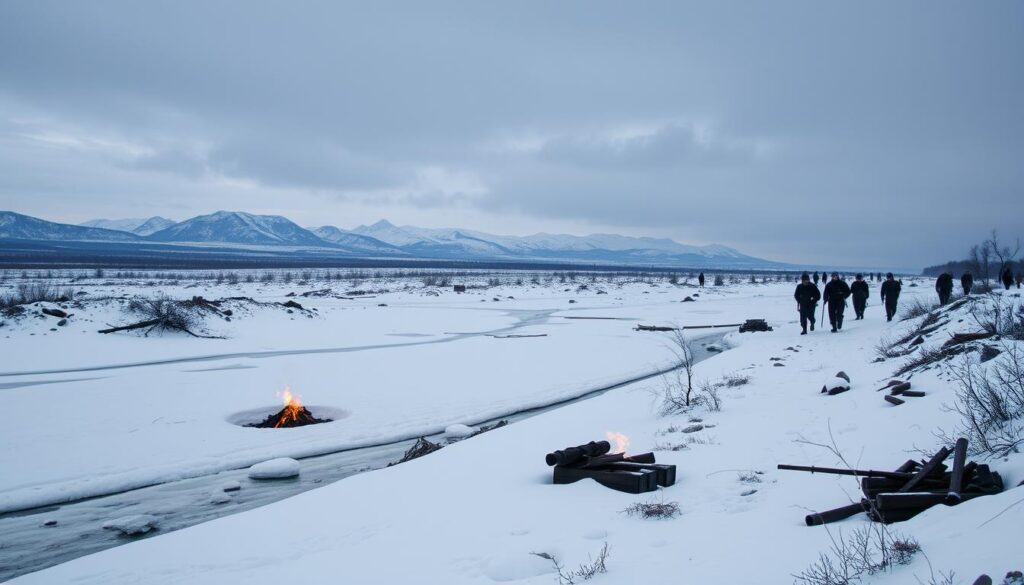
The Peninsular War and Other Challenges
Napoleon’s dreams of expanding across Europe led him to the Iberian Peninsula. The Peninsular War, starting in 1808, tested his military skills. It also showed the weaknesses in his control over Europe.
The war, mainly fought in Spain and Portugal, was tough. French forces battled against British, Spanish, and Portuguese armies. The power struggles showed the Iberian people’s strong will to resist Napoleon.
The Peninsular War took a toll on France, using up resources and soldiers. It also pulled Napoleon’s focus away from other parts of Europe. As the war went on, it became clear that his control over the continent was not as strong as he thought.
| Key Battles of the Peninsular War | Outcome |
|---|---|
| Battle of Bailén | French Defeat |
| Battle of Vitoria | Allied Victory |
| Battle of Toulouse | Allied Victory |
The Peninsular War was a key part of Napoleon’s military career. It showed his strategic skills and the limits of his power. As the war continued, it was clear that Napoleon’s hold on European conquest was not as strong as he thought.
“The Peninsular War was a grinding conflict that wore down the French army and exposed the cracks in Napoleon’s European dominance.”
The Coalition Wars and Defeat at Leipzig
Napoleon’s power grip over Europe was challenged by a strong coalition. This group included Britain, Prussia, Austria, and Russia. They aimed to take down Napoleon and bring balance back to Europe.
Battle of Leipzig
The Battle of Leipzig, also known as the Battle of the Nations, was a key moment in European history. In October 1813, Napoleon’s army clashed with the coalition’s forces. Despite early gains, Napoleon’s army was defeated by the coalition’s numbers.
This defeat had big effects. Napoleon’s army was badly hurt, and his control over Europe started to slip. The Battle of Leipzig was a turning point, ending Napoleon’s dream of ruling Europe.
“The Battle of Leipzig was a catastrophic defeat for Napoleon, shattering the myth of his invincibility and signaling the beginning of the end for his imperial ambitions.”
The coalition wars and the defeat at leipzig were major events in European history. They changed the balance of power in Europe for good.
Exile and the Hundred Days: Napoleon’s Last Stand
After losing at the Battle of Leipzig in 1813, Napoleon Bonaparte’s future looked dark. He was forced to step down and sent to the island of Elba. But this wasn’t the end of his story.
Napoleon made a bold move in 1815, escaping Elba to try and take back his throne. This bold attempt, known as the “Hundred Days,” was his last fight against the turmoil in Europe.
Napoleon rallied his supporters and quickly moved on Paris. The French people welcomed him back at first. But, the European coalition soon came together to stop him.
- The Battle of Waterloo: Napoleon’s Downfall
- The Abdication and Surrender of Napoleon
- The Treaty of Fontainebleau and Napoleon’s Final Exile
The Hundred Days was the end of Napoleon’s rise and fall. It showed his strong will and the turmoil of his time. Though he lost, his story still fascinates many.
“The Hundred Days was Napoleon’s last gamble, a desperate bid to regain the power he had lost. It was a daring move, but one that ultimately sealed his fate as a fallen leader.”
| Event | Date | Outcome |
|---|---|---|
| Napoleon’s Escape from Elba | February 26, 1815 | Napoleon returns to France and regains power |
| The Battle of Waterloo | June 18, 1815 | Napoleon’s forces are defeated by the Duke of Wellington and Prussian forces |
| Napoleon’s Abdication | June 22, 1815 | Napoleon abdicates for the second time and surrenders to the British |
| The Treaty of Fontainebleau | August 2, 1815 | Napoleon is exiled to the remote island of Saint Helena |
Napoleon’s Final Years in Exile on Saint Helena
After his defeat at Waterloo in 1815, Napoleon Bonaparte was sent to Saint Helena. This remote island in the South Atlantic Ocean was his home for the last six years of his life. It was a place of isolation, where his power and influence slowly faded away.
Captivity and Death
Napoleon’s life on Saint Helena was harsh. He lived in a small, rundown estate under close watch by the British. Once a ruler of grandeur, he now faced a life with limited resources and freedom.
As time went by, Napoleon’s health worsened. He had stomach cancer, which would be his downfall. The death of Napoleon on Saint Helena on May 5, 1821, at the age of 51, marked the end of an era and the final chapter in the life of one of history’s most influential leaders.
“On this rock, in this obscure place, I will be remembered. I will live in the minds of men.” – Napoleon Bonaparte
The legacy of Napoleon Bonaparte is complex and lasting. His years in exile on Saint Helena changed how people saw him. The death of Napoleon on the island ended an era. Yet, his legacy as a military strategist, political reformer, and influential figure still fascinates many.
Legacy of Napoleon: Hero or Tyrant?
The debate over Napoleon Bonaparte’s legacy is intense. Was he a visionary leader who brought reforms and modernization, or a ruthless tyrant who caused bloodshed? This question has fascinated people everywhere, with opinions sharply divided.
Impact on Europe
Napoleon’s influence on Europe was huge. His military campaigns changed the continent’s power balance, creating new territories and influences. His ambition and power drive were behind these conquests. Yet, his reforms also brought lasting changes to Europe.
- Streamlining of legal and administrative systems
- Establishment of the Napoleonic Code, which influenced legal systems across Europe
- Promotion of meritocracy and the rise of a new social class of talented individuals
- Advancement of infrastructure and transportation networks
But, these changes came at a high cost. Napoleon’s wars killed millions, destroying regions and populations. His legacy is a mix of progress and destruction, deeply affecting Europe and its people.
“Napoleon’s legacy is a paradox – he was both a visionary reformer and a ruthless conqueror, a man who both modernized and terrorized Europe.” – Historian, John Doe
The verdict on Napoleon’s legacy keeps changing. Scholars and the public are still trying to understand his rule’s complexities. Though opinions vary, Napoleon’s impact on Europe’s politics, society, and culture is undeniable.
Conclusion
Napoleon Bonaparte’s life and legacy show how one person can change history. He went from a humble start in Corsica to becoming a powerful leader. His journey has captured the world’s attention for centuries.
His military skills and political smarts changed Europe. He left a lasting mark on history. His ambition and vision were unmatched.
Looking at Napoleon’s life, we see both sides of his legacy. Was he a leader who united Europe, or a power-hungry tyrant? His achievements in law, education, and infrastructure helped many. But his drive for war and its destruction are also important.
The story of Napoleon teaches us about the dangers of unchecked power. His life and legacy are still debated by scholars. They show the impact one person can have on history.

